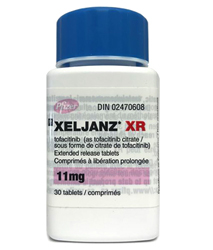What is Xeljanz (Tofacitinib) prescribed for?
Xeljanz is a prescription medicine used to treat the symptoms of moderately to severely active Rheumatoid Arthritis, Psoriatic Arthritis, and active Ulcerative Colitis. Xeljanz may be used alone or with other medications. Xeljanz belongs to a class of drugs called DMARDs, Immunomodulators; DMARDs, JAK Inhibitors. Xeljanz may lower your white blood cell's ability to fight infections. This may make you more likely to get a serious (rarely fatal) infection or make any infection you have worse. Tell your doctor right away if you have any signs of infection including sore throat that doesn't go away, fever, chills, cough, trouble breathing, painful/frequent urination, non-healing skin sores).
Xeljanz (Tofacitinib) FAQs
How To Use Xeljanz?
Take this medication by mouth with or without food as directed by the medication guide and your doctor, usually once or twice daily.
If you are using the liquid form of this medication, carefully measure the dose using a special measuring device/spoon. Do not use a household spoon because you may not get the correct dose.
The dosage is based on your medical condition, response to treatment, lab tests, and other medications you may be taking. Be sure to tell your doctor and pharmacist about all the products you use (including prescription drugs, nonprescription drugs, and herbal products).
Children's dosage is also based on weight. Do not increase your dose or use this drug more often or for longer than prescribed. Your condition will not improve any faster, and your risk of serious side effects will increase.
Take this medication regularly to get the most benefit from it. Remember to take it at the same time(s) each day.
Tell your doctor if your condition does not get better or if it gets worse. If you are 50 years of age or older you may have an increased risk of cardiovascular events. Since it makes it harder for your immune system to fight infections, you may have a higher risk of tuberculosis (TB) and fungal infections.
Seek immediate medical attention if you experience an allergic reaction.
What are the possible side effects of Xeljanz?
Xeljanz may cause serious side effects including:
- heavy sweating
- mouth sores
- shortness of breath
- weight loss
- lightheadedness
- cough with pink or red mucus
- burning pain
- fever
- feeling very tired
- dark urine
- cold hands and feet
- stomach pain
- pale skin
- sweating
- pain, swelling, or redness in an arm or a leg
- loss of appetite
- chills
- yellowing of the skin or eyes (jaundice)
- itching
- pain or burning when you urinate
There are other side effects that may occur that are not listed on this page.
Additional information about side effects can be obtained from your physician.
What are Drug Interactions of Xeljanz?
Few known Drug Interactions of Xeljanz are listed below:
- Lyrica (Pregabalin)
- Tramadol
- Lisinopril
- Gabapentin
- Metformin
- Levothyroxine
- Vitamin D3 (Cholecalciferol)
- Prednisone
- Cymbalta (Duloxetine)
- Amlodipine
- Plaquenil (Hydroxychloroquine)
- Omeprazole
- Pantoprazole
- Methotrexate
- Meloxicam
- Atorvastatin
- Losartan
- Folic Acid
- Vitamin B12 (Cyanocobalamin)
A complete list of Xeljanz Drug Interactions is not available on this page.
Consult your physician if you have any questions about this medicine's drug interactions.
How much does Xeljanz cost in Canada?
Starting price of Xeljanz 5mg cost in Canada
- 60 tabs - $1879.50 USD ($31.33 per tabs)
- 120 tabs - $3675.00 USD ($30.63 per tabs)
- 180 tabs - $5238.45 USD ($29.10 per tabs)
Starting price of Xeljanz 10mg cost in Canada
- 60 tabs - $3139.50 USD ($52.33 per tabs)
- 120 tabs - $6184.50 USD ($51.54 per tabs)
- 180 tabs - $9122.40 USD ($50.68 per tabs)
